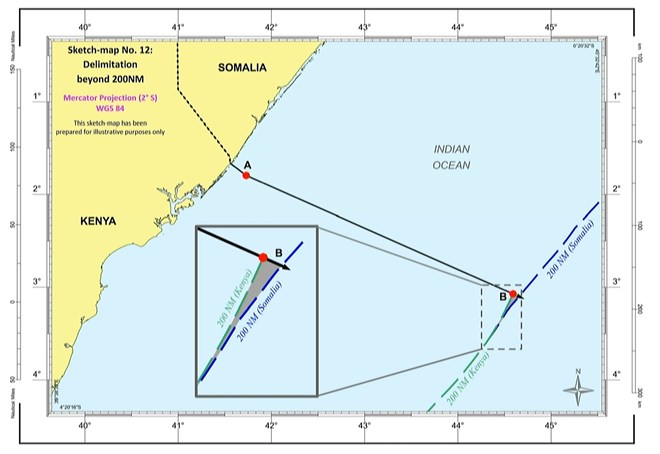
Top UN court rules in favor of Somalia over Kenya in maritime dispute
|
12 October 2021 19:14

THE HAGUE (Horn Observer) - The International Court of Justice on Tuesday awarded Somalia control of most of a potentially oil- and gas-rich chunk of the Indian Ocean after a legal battle with Kenya over their sea border.
A fifteen-judge panel of the International Court of Justice (ICJ) rejected Kenya's claim that there had been an agreed maritime boundary with Somalia and ruled that the maritime border should run on equidistant or on a median line as suggested by Somalia.
The Court ruled that the equidistant rule which Somalia had proposed was the legally acceptable method in settling the continental shelf boundaries contrary to Kenya’s parallel to the latitude option.
The Court said that it was not convinced by Kenya's argument that the new maritime boundary would have catastrophic effects on the livelihood and economic wellbeing of Kenyan's.
"17 of the 19 fish landing sites are located in the Lamu archipelago and would therefore be unaffected by the equidistant line."
The ICJ ruled there was "no agreed maritime boundary" and drew a new border close to the one claimed by Somalia, although Kenya kept a part of the 100,000 square-kilometre (38,000-square-mile) area, chief judge Joan Donoghue said.
"The court unanimously finds that there is no agreed maritime boundary between the Federal Government of Somalia and the Republic of Kenya that follows that parallel of latitude."
"Kenya has not consistently maintained its claim that the maritime border with Somalia is defined by the line of latitude between the two side," said the presiding judge at ICJ, Joan E. Donoghue.
The Hague-based court asked both parties to amicably solve the current dispute.
Rulings by the ICJ, which was set up after World War II to resolve disputes between UN member states, are binding and cannot be appealed.
The court has no overt means of enforcing judgments but can refer violations to the United Nations.
Leave a comment
- Popular
- Rated
- Commented
04/11/2021 - 11:05:02
28/05/2024 - 15:44:10
02/12/2021 - 11:34:53
01/03/2021 - 09:00:37
Opinions
15/05/2025 - 20:16:04
02/04/2025 - 18:34:53
Politics
17/04/2025 - 01:58:17
13/04/2025 - 10:59:05
Terror Watch
18/05/2025 - 00:37:46
15/05/2025 - 00:59:16
 0
0 




































Top UN court rules in favor of Somalia over Kenya in maritime dispute
THE HAGUE (Horn Observer) - The International Court of Justice on Tuesday awarded Somalia control of most of a potentially oil- and gas-rich chunk of the Indian Ocean after a legal battle with Kenya over their sea border.